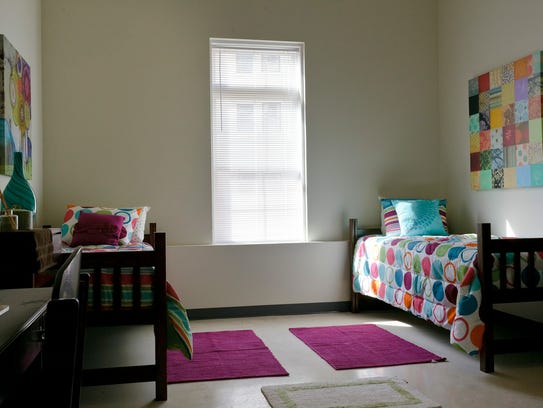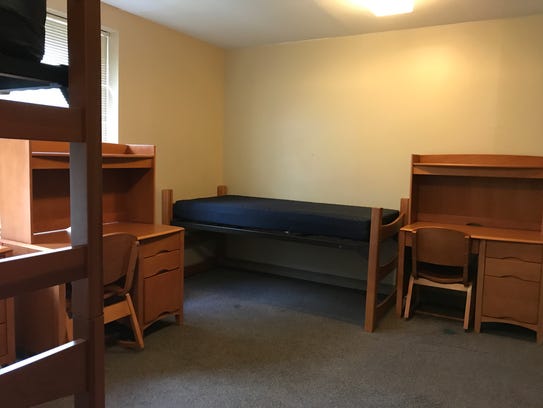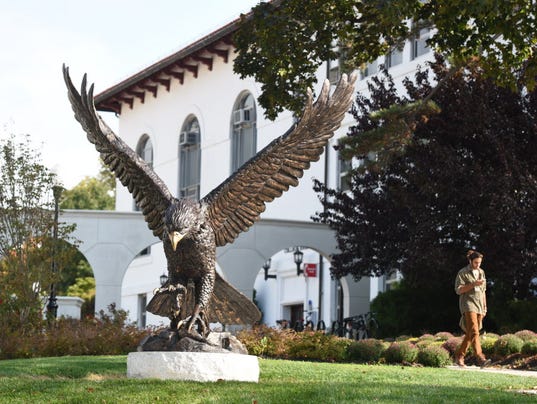Sober housing for recovering addicts

Kristine De Jesus, a staff psychologist and coordinator of the Alcohol and Other Drug Program at MSU, speaks about the services the school offers to students dealing with alcohol and drug abuse. Mollie Shauger/NorthJersey.com
For students recovering from drug and alcohol addiction, the typical college campus can seem like a minefield of temptation, with frat parties, tailgating and late night rounds of beer pong.
To help recovering students cope, Montclair State University has set aside a floor in one of its dormitories for those committed to sobriety. Officials hope it will give recovering students a refuge on campus, as well as a way for them to develop a small community of classmates who can provide each other support.
The initiative at Montclair State is part of a growing trend nationally, with about 50 colleges and universities now offering similar campus housing opportunities. After the success of housing for sober living at Rutgers University -- the first school in the country with such a program -- a new state law will require similar options at most of New Jersey's colleges and universities by 2019.
The Montclair State program, called Residents In Recovery, includes access to psychological and addiction services, rides to addiction support groups in nearby communities and substance-free activities that can substitute for the typical campus party scene.
"Our ultimate goal is to give young people in recovery a place to succeed and thrive...to be seen and be comfortable, because a lot of times there's a lot of isolation that comes in early recovery," said Kristine De Jesus, a staff psychologist and coordinator of the Alcohol and Other Drug Program at MSU.
 Montclair State University." width="540" height="405" />
Montclair State University." width="540" height="405" />A dorm room at Montclair State University. (Photo: Photo courtesy of Mike Peters/MSU)
"By creating that safe space for them, what we're hoping is that it creates positive change across campus...where there's a respect and honor to be substance-free," she said.
Universities nationwide are increasingly concerned with how to help students maintain their recovery or prevent them from becoming addicted in the first place. In 2014, 18- to 25-year-olds had a 16.3 percent rate of alcohol dependence or abuse, the highest rate among any age group, according to the federal Substance Abuse and Mental Health Services Administration.
Every year, a new substance that students are using seems to pop up, though De Jesus noted that alcohol and marijuana are "still the drugs of choice for young people, overwhelmingly." Opioids have also been a problem for about five years now, she said.
A fifth of the campus population doesn't use any alcohol or drugs, De Jesus noted.
Commit to abstain
Montclair is reserving seven dorm rooms, with space for 14 to 16 students, for those who want to live substance free. At least 12 students have applied to live in the rooms, officials said.
The students don't all have to be in recovery. They may have family members or friends who are addicted or in recovery, and want to be in an environment free from addictive influences. Others may join as part of a wellness program offered at the college for students who want to improve or maintain healthy lifestyles while on campus.
 Kristine De Jesus, a staff psychologist and coordinator" width="540" height="405" />
Kristine De Jesus, a staff psychologist and coordinator" width="540" height="405" />Kristine De Jesus, a staff psychologist and coordinator of the Alcohol and Other Drug Program at MSU, speaks about the recovery and counseling services available to students. (Photo: Mollie Shauger/NorthJersey.com)
Students interested in the recovery housing have committed to abstain from alcohol, drug and tobacco use on the floor. When they arrive on campus, they have to be 90-days sober. The dorm rooms are not marked, so other students don't have to know that this is a special area.
Kevin Schafer, assistant director of Housing Services in the Residence Life office, said the housing gives students who never thought they might be able to live on campus an opportunity to do so. He hopes it could expand to other buildings.
Students in the recovery housing will meet with university staff on a regular basis and have access to counseling and psychological services in addition to meditation, yoga and other recreational activities, especially on Thursday nights, a traditional party time at the school.
Professional staff will be on call at all hours. The resident assistant who lives on the floor will be trained to work with people in recovery.
The university is also working to coordinate rides to local community meetings like Alcoholics Anonymous and Narcotics Anonymous.
Montclair State does not do drug testing, De Jesus noted. "The expectation is that they're going to maintain their sobriety," she said. "The reality is in collegiate recovery, less than 10 percent of the population actually relapses, so it's really unlikely that people will relapse."
Binge drinking
Alcohol abuse has been a decades-long problem on college campuses. Drinking by college students ages 18 to 24 contributes to an estimated 1,825 student deaths every year, according to the National Institute on Alcohol Abuse and Alcoholism. The institute estimates that annually 696,000 students are assaulted by another student who has been drinking, and there are 97,000 cases of sexual assault or date rape each year.
In one of the more notorious recent cases, a grand jury in May concluded that fraternity members of Beth Theta Pi fraternity at Pennsylvania State University were indifferent to the well-being of sophomore Timothy Piazza, 19, who died after a night of binge drinking and hazing in February. Piazza had fallen multiple times, including down a flight of stairs, causing him multiple traumatic brain injuries, a fractured skull and a lacerated spleen.
 Montclair State's recovery residences," width="540" height="405" />
Montclair State's recovery residences," width="540" height="405" />A dorm room at Montclair State's recovery residences, before students move in. (Photo: Mollie Shauger/NorthJersey.com)
Eighteen former members of the Penn State fraternity face charges ranging from manslaughter and aggravated assault to serving alcohol to minors.
The Chronicle of Higher Education reported in 2014 that partying on campus is getting even more intense. “More students now drink to get drunk, choose hard liquor over beer, and front-load, or drink in advance of social events,” the Chronicle wrote.
Pioneering Rutgers
Rutger's University pioneered the idea of sober dorms in 1988 and its New Brunswick campus now offers 38 beds in the Recovery Housing program. The Newark campus offers two recovery apartments with eight beds.
Twenty five new and returning students will be living in the New Brunswick campus' sober dorms this school year, according to campus spokesman Neal Buccino. Among the success stories the university cited from the program were high graduation rates, high recovery rates -- with an average of 94 percent over eight years -- and the positive support of the recovery community at Rutgers and the families of those students.
In the past few years, the idea of helping students recover or abstain from substances has spread nationwide. Roughly 150 colleges and universities in 49 states now offer recovery services, according to the website quitalcohol.com, which provides guidance and support for addicts. In addition, about 50 schools nationwide currently offer sober housing options, including small private colleges and major universities like Penn State and George Washington.
State mandate
The MSU recovery rooms are opening before a state law goes into effect which mandates that four-year public colleges and universities that have 25 percent or more of their students living on campus provide substance-abuse recovery housing. Along with MSU, the law applies to Rutgers-New Brunswick, Ramapo College, The College of New Jersey, Rowan University and Stockton University .
Even before the state legislation was signed in 2015, MSU was already looking into offering such housing and had identified the space for it. But officials said they didn't realize all that was involved in supporting the students in recovery.
 Montclair State University's" width="540" height="405" />
Montclair State University's" width="540" height="405" />A room for group counseling at Montclair State University's Counseling and Psychological Services department. (Photo: Mollie Shauger/NorthJersey.com)
The state mandate does not come with additional funding, so the university has been pooling its own resources to pay for programs and associated items like furniture and yoga mats. The college has started to explore opportunities for grants through local organizations as well, officials said.
Marie Cascarano, MSU's Health Promotion coordinator, pointed out that the students in the recovery programs graduate with higher GPAs than the general student population.
"They have higher retention rates, and they tend to graduate in the four years," she said.
Ramapo College is on target to offer housing by the autumn of 2019, according to officials. "Providing a comprehensive recovery program will provide students with a safe space within Ramapo College where they can pursue their education without sacrificing their recovery," the college said in a statement from Judy Green, director of the Center for Health and Counseling, and Cory Rosenkranz, counselor and coordinator for substance abuse and violence prevention.
At TCNJ in Ewing, the Lion’s House offers students in recovery a living space with a support system. Chris Freeman, who oversees the program, said two students had signed up to live in the Lion's House this year, though ten students are connected with the overall recovery programs offered at the college.
"What’s really beautiful and amazing is how these small groups of students really supported one another when they were going through difficult times," Freeman said.
One student even celebrated the longest continued phase of sobriety they’ve ever had, he noted.
Email: gray@northjersey.com
 Montclair State University" />
Montclair State University" />
Comments
Post a Comment